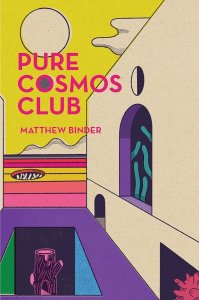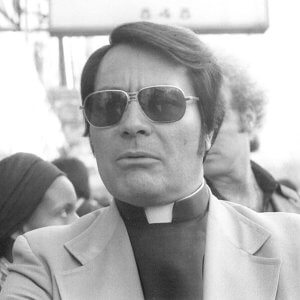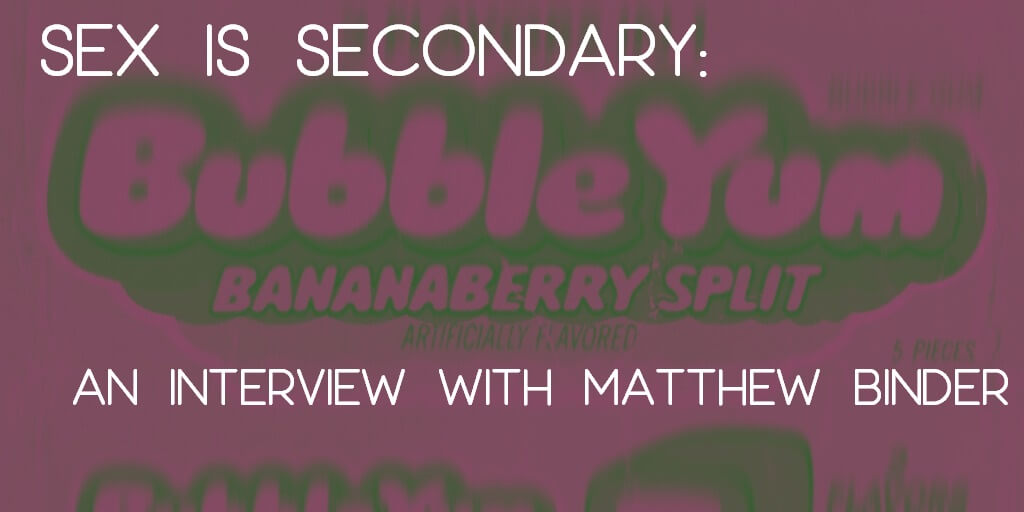 When absurdity itself is absurd there is going to be trouble. Matthew Binder mines the hangover of post-millennial tension to drop a bewildering record of a culture imploding in saturation malaise. With his novel Pure Cosmos Club (Stalking Horse Press, 2023) Binder depicts a world not only beyond satire but pathologically resigned to its fate. A boisterous picaresque, the book embraces its sharply flawed characters with generosity as they face the mounting struggles inherent in navigating a society in apparent ironic meltdown. Just pray you never run out of bubblegum.
When absurdity itself is absurd there is going to be trouble. Matthew Binder mines the hangover of post-millennial tension to drop a bewildering record of a culture imploding in saturation malaise. With his novel Pure Cosmos Club (Stalking Horse Press, 2023) Binder depicts a world not only beyond satire but pathologically resigned to its fate. A boisterous picaresque, the book embraces its sharply flawed characters with generosity as they face the mounting struggles inherent in navigating a society in apparent ironic meltdown. Just pray you never run out of bubblegum.
Rebecca Gransden: One of the defining elements of the novel is the use of digressions and anecdotes by Paul. His scatterbrained and flighty recounting of his history or detailed factoids are a source of much amusement. How did this stylistic choice come about?
Matthew Binder: Paul’s instincts and worldview are all topsy-turvy. I thought it was important to show the reader some of the events from his youth that shaped the man he was to become. Of course, the reader is only getting Paul’s account of things, which surely is of questionable veracity.
RG: Janie and Orsi take their parts as Paul’s loves, with Janie being someone he is moving on from and Orsi arriving as a new interest. It is difficult to pin down if Paul is a romantic of the incurable kind or a hopeless sociopath. How do you view the representation of affection, attachment and sex in the novel?
MB: The true love story in the book is between Paul and his dog, Blanche. But Janie and Orsi both play important roles in Paul’s development—or maybe regression is the right word—as a character. It’s funny, looking back now, I realize that all the men in the book eventually succumb to the sheer force of Paul’s spirit, but the women never do. They are impervious to his powers.
As for sex, Paul is essentially passive. He only has sex when it’s foisted upon him, and it’s not even clear that he enjoys it. Most of his narration during sex is about how he’s fighting to stave off his neurotic impulses. Paul seeks love and security, sex is secondary.
RG: The undoubted star-power-heart of the novel is Blanche. The relationship between Paul and Blanche is for the most part indecipherable, but could be viewed variously as: co-dependent, perhaps fed by the fact that Blanche’s dog-on-wheels status is caused by Paul’s actions; supportive, with Blanche frequently providing the role of Paul’s guardian angel; or parasitic, with it unclear just who in the relationship is the parasite. At times Blanche comes across as an inverse Littlest Hobo, at others a more fabulous Yoda. Is there a real-life inspiration for Blanche, or did she arrive just like magic?

MB: My ex-girlfriend was a director at a brand called The Row. She was my gateway to the worlds of luxury fashion and big-money art. On a few occasions, I found myself at parties hosted by an art dealer named Michael Bargo. Michael’s dog, Temo, had bum legs, so he was fitted with a wheelchair. At the parties, I’d usually get drunk and high and then spend the bulk of my time petting Temo. The bond we forged served as the foundation for the novel.
RG: A feature of the novel is the frantic pace of city-living, where the array of choice, and speed of constant stimulation, creates a frenetic baseline. How would you describe your take on New York City?
MB: I’m from New Mexico. Locals refer to the state as “The Land of Mañana,” which means we don’t do today what we can put off until tomorrow. I didn’t move to New York City until my thirties, and I was ill-equipped to deal with the pace of life. During my first year in NYC, I was fired from two jobs for failing to meet even the minimum expectations. This, of course, caused me to lose my psychic bearings.
RG: Should you, could you, would you bleed blood for your art, and if so, how much?
MB: Should I? Probably not. Could I? Yes, of course. Do I? Every few years.
Over the past decade a pattern has formed. I work for two or three years in the energy business, squirreling away as much money as I can while the intractable urge to write mounts, and then I quit (or get fired) and move somewhere foreign and remote to work on a novel. When the book is finished and my savings are spent, I return to the corporate world and begin the cycle anew. My novel-writing method ensures I spill as much blood and money as possible.
RG: “The Pure Cosmos Club’s moral imperative is not guided by a political vision but a divine one. We have a duty to transcend the drudgery of our daily lives by tapping into the universal mind, the oneness of all things. Come and grow with us—emanate your energy and power!” The Pure Cosmos Club takes its template from religious organizations with a cultish air, many a front for New Age grift, often with a conservative agenda, such as Summit Lighthouse. What made you want to address this world for the novel? Did any particular group inspire you?
MB: The initial inspiration for my cult leader was a friend who was touring the country with Oprah, leading mass meditations to arenas full of acolytes while secretly hating himself because he had yet to build a billion-dollar company, like his childhood best friend. I was fascinated by the dichotomy between how revered this friend was by others and how much self-loathing he personally suffered. But I wanted to take the story places beyond bliss and into the realm of the occult, so I started doing research on Heaven’s Gate and  Jim Jones. Ultimately, though, Pure Cosmos Club is something wholly unique, if only because we see it through Paul’s eyes.
Jim Jones. Ultimately, though, Pure Cosmos Club is something wholly unique, if only because we see it through Paul’s eyes.
RG: Many of the characters are seekers of one type or another, and a theme is the projection of meaning, with characters frequently seeing what they want to see. Your characters approach spirituality similarly to the way they engage with all other areas of life, extracting what they need out of convenience. Reflecting on the novel now, where does it stand when it comes to faith, meaning and cynicism?
MB: I never write with the intention of exploring any specific subject matter. It’s only afterwards that I can look back and realize the themes I was wrestling with. In retrospect, it’s obvious to me that I’m writing about my desire to feel a part of something greater than myself. I know that’s an impossibility, however, because I’m a cold realist and not a romantic. But that doesn’t negate the longing.
RG: One of my favorite film stars is Darla, most famous for her scene-stealing role as Precious in The Silence of the Lambs. Who would you cast—human, canine, or other—for the part of Blanche, in the film biopic of her life?
MB: Is it possible for A.I. to recreate Audrey Hepburn? Perhaps only she could embody the perfect combination of elegance, stateliness, and tenacity. That is Blanche.
RG: Paul possesses a potentially problematic bubblegum habit. Best flavor of bubblegum for winding down after reading Pure Cosmos Club?
MB: Everyone utilizes coping mechanisms to deal with the stresses of life. Some people use drugs or drink, savvier people exercise. Paul chews copious amounts of bubblegum.

As a kid, I was obsessed with a flavor of Bubble Yum called “Bananaberry Split.” When I chewed it, I would refuse to open my mouth to speak or even breathe because I was afraid the flavor would escape. These days, though, I don’t chew much gum.
RG: Lastly, what is next for you? What have Matthew Binder fans got to look forward to?
MB: I’m trying to work up the courage and the money to quit my job so I can write the next novel, however, I’m failing on both accounts. In the meantime, I’m actively making music with my friend Kamoo. If such a thing as a “Matthew Binder fan” exists, then they should check out my recording project Bang Bang Jet Away.

